- Home
- Tad Williams
Empire of Grass Page 8
Empire of Grass Read online
Page 8
“Of course, Master!”
“So full of wisdom. So full of help for every situation.” Viyeki began to read. “The Five Fingers are the tools the Queen, the Mother of the People, uses to feed and shelter and protect her people. Without a knowledge of these tools and how they are used, without an energetic determination to act for the good of all the People, a noble can only hinder, not help, the Queen in her great work.’ You agree of course, Nonao?”
“Of course, Master. They are the words I live by, and which are always uppermost in my thoughts as I strive to serve you and the Mother of All.”
“Good, good.” He ignored Nonao’s increasing anxiousness. “How wise was great Xohabi! Give your ear to this, Nonao-tza—the elegant simplicity of his words entrances still, all these Great Years later! ‘Loyalty to the People is the first finger. Without dedication to your own kind, you are no better than a solitary witiko’ya in the wilderness, hunting without a pack, dying alone of starvation.’ So true! Who would reject his own people? And what else should be the lot of such a fool or traitor but death?”
“Yes, Master.”
“And how much joy I get from revisiting these words, no matter how often I have read them before. Loyalty to the race! Loyalty to the city! Loyalty to the order and, of course, loyalty to our queen and the Garden that birthed us . . . !” He shook his head in mock-wonder. “I have heard it said that in this one slender volume is written every word needed for a good life. I shall never tire of it.”
Nonao was wringing his hands together, too anxious now even to hide it. “No one reveres Xohabi—or you—more greatly than I do, Master, and please forgive my unpardonable interruption . . .”
Viyeki decided he had tormented his servant long enough. He did not dislike Nonao personally, but he knew beyond doubt that the new secretary was passing information to the relatives of Viyeki’s wife Khimabu and doubtless to others as well. It would have been virtually impossible to find someone utterly honorable and incorruptible to fill the position—there were very few such creatures to be found in all of Nakkiga, and none of them had the talent or intelligence to do a good job with anything more challenging than spreading oil on a slice of puju—so he was content with a secretary he knew from the start not to trust.
But my old master Yaarike would have warned me not to treat him too badly. Better a casual enemy than a determined one. And if I make too much obvious sport of the Five Fingers, he’ll report that to the listening ears as well. The book was an object of near-religious veneration among the noble classes, although Viyeki had no doubt that many of its most noisy proponents were no more inspired by Xohabi’s legendary fawning than he was.
So we make liars of ourselves, and by doing so, prove Xohabi a liar also.
It was a new thought, and one that brought him a pang of what felt like sudden fright. Was he losing his mind, that such heretical thoughts came to him so easily these days?
* * *
• • •
The Sacrifices stood lined up at one end of the camp in their martial rigor, along with Viyeki’s Builders and the rest of the company, as the prince-templar’s party made its way up to the hilltop beneath the deep blue of a clear night. All expression absent from his face but serene satisfaction—the only proper look for a high noble in the presence of the very highest noble family, the queen’s—Viyeki observed that the prince-templar was dressed in the full panoply of his sacred station, robed and hooded in white with yellow ornamentation. His Serene Highness Pratiki wore his white hair long and unadorned. His skin was so pale it almost seemed to glow from within, like the wax of a burning candle, but the prince-templar’s eyes, though calm and almost sorrowful in appearance, watched everything carefully. He was of the queen’s Hamakha clan, but of much more recent generation than most of the queen’s most trusted servitors, in fact just a little older than Viyeki himself. Viyeki had only met the prince-templar a few times—before he had become a high magister their circles of acquaintanceship had barely intersected, and even afterward they seldom frequented the same gatherings—but he had heard nothing to make him think badly of Pratiki. Still, the princeling seemed to be here to lend some kind of official support for what Viyeki thought a rash invasion of the mortal lands, so he knew he would have to treat the royal clansman with gracious caution.
Surprisingly, for one of the ruling caste, Pratiki had not brought much in the way of an entourage, just a hand of Hamakha Dragon Guards and a few clerics. Nor did he unduly drag out the welcoming ceremony. Viyeki went first, greeting Pratiki with all due respect but avoiding flowery speech, which he had heard the prince-templar did not like. That bit of gossip seemed to be true, as Pratiki then watched with little enthusiasm while General Kikiti, lean and tall as a stork, made lengthy protestations of loyalty to the queen and Clan Hamakha, then was followed by Sogeyu and her Order of Song minions welcoming him with all their own ancient and ornate formulas. When they had finished, Pratiki said, “I am certain there is more important work to be done than seeing to the comfort of a mere religious official, but I thank you on behalf of the Mother of us all. You may all go now. My servants will see that I am housed. Oh, and High Magister Viyeki, will you grant me the courtesy of a short audience?”
This was intriguing, if a tiny bit worrying. Viyeki waited as the prince-templar’s tent was erected—it had more sides than Viyeki’s own simple lean-to, but was otherwise quite spare and unassuming—then Pratiki sent his clerics away.
“How goes the queen’s task?” he asked Viyeki when they were alone in the tent.
“I have little progress to report, Prince-Templar.” Viyeki framed his words carefully. “The time for my Builders to do their part has not yet come. Although of course I do my best every hour and every day to serve the Mother of All.” General Kikiti had told Viyeki that they would be excavating the tomb of legendary Ruyan Vé the Navigator himself, hero of the Tinukeda’ya race, whose grave had lain hidden for years beneath the fortress that mortals called Naglimund. Naglimund stood only a short distance away across the valley, but at the moment, several thousand mortals still occupied the fortress, many of them well-armed soldiers. Viyeki did not know exactly what such a task would entail, and also could not imagine any way, short of open warfare, that the tomb could be reached. But those were not the kinds of questions he was going to ask a lord of the high Hamakha.
“Of course,” said Pratiki with what almost seemed the hint of a smile. “I did not mean to suggest you should have finished it already, High Magister. I know you are a loyal supporter of the queen. You are Clan Enduya, as I remember. An old and worthy family with a long record of service to the throne.”
Viyeki could not help wondering whether another meaning swam beneath the prince-templar’s words, but said only, “You are kind, Serenity.”
“We will be thrown together frequently, you and I,” said the prince-templar. “I know you will serve the queen with wisdom and courage. I wished only to say to you that I am aware sometimes it is difficult to reconcile the needs and wants of different Orders, and that this may be one such time. Please do not hesitate to come to me if you need assistance or advice.”
“I will think of you as though you were the queen herself, gifting me with time and attention I could never deserve.”
Pratiki nodded, but did not seem entirely satisfied by the answer. For his own part, Viyeki could only wonder why a member of the queen’s own family was here in the middle of nowhere, on the eve of a new war against the mortals. And what could the Mother of All want with the remains of a long-dead Tinukeda’ya, even such a famous one as Ruyan the Navigator?
He bowed to an appropriate depth before the prince-templar. “All praise to the queen, all praise to her Hamakha Clan,” he said.
4
In the Storm
In his dream she stood over him. He could not see her, but could feel her presence, straight and cold as a sword’s blade. He could feel
her perilous anger, too, but it did not seem to be aimed at him—or at least he prayed that was so.
The winds are too strong, she said. They blow my words back at me, or carry them into darkness to be swallowed and forgotten.
Morgan knew he was dreaming and desperately wanted to wake, but it felt as though something pressed him, held him down in sleep, helpless as a swaddled child.
You must tell them. You must tell them for me. The winds are too strong.
He had felt this angry presence before, but in his dream he could not put a face to it, perceived only swirling shadows and splashes of light, like a shattered church window, the mournful saints in fragments, mournful eyes, weeping, moaning mouths.
Who are you? He did not say it, but the presence seemed to catch his thought.
You know me, mortal child. You know me. First Grandmother knew your grandsire. I feel the touch of her on you—and something else . . . the taste of the Dreaming Sea . . .
And then he woke, bereft and alone once more—lost, lost, lost in the endless Aldheorte. He did not weep this time because he no longer had the strength, but he wished he could. Anything to wash such bleak strangeness out of his head. He could not bear to think about it. He knew the forest was trying to drive him mad.
* * *
• • •
Hot, wearying days and chilly nights crawled by, each as hopeless as the last. Morgan found himself daydreaming of wine, of brandy, even of weak beer, anything wet that would draw a curtain over his miserable thoughts. He brooded over the memories of every pitcher or tankard that had been spilled in his presence. He wanted something other than water to drink so fiercely that he would gladly have licked the filthy floor of the Quarely Maid just to get what had dripped or splashed on it. His hunger had gone away, but only because it was replaced by a miserable flux that gripped his hollow guts and emptied them again and again, long past the time when there was anything to empty. His head seemed to smolder like a hot coal.
Hell is no wine, he thought. Hell is a dry mouth and a burning head.
After the sun had risen and set a few times, the unholy craving began to diminish, but he still felt ill, and ached as if he had been beaten. Still, Morgan forced himself to keep walking, trying to hold to a straight line southward, but although he did not find himself back at his beginning as he had the first time, each exhausting day ended the same way, with Morgan still in deep forest.
He thought often about discarding everything he carried that had no use or purpose but which pulled on him—his sword, his mother’s Book of the Aedon, the ridiculous irons that Snenneq had presented to him. And the heavy armor? What use was armor against despair? What use against starvation and the stealing of his wits? But although he took off his weighty shirt of chain mail, he could not bring himself to discard it, so he wore it draped over his shoulders and pretended to himself he might want it again. A last, a still sensible part of him knew that if he began to discard all that seemed useless he would not stop; eventually he would be naked but for a few rags, eating leaves and grass and drinking dew, like a broken-minded hermit. He would leave nothing behind when he died but his skeleton, and even those who found him would never know who he had been.
The naked prince. Prince of Bones. Morgan the Pointless, last of his line.
Something kept him from surrendering, and after another day or two the wild, unreasoning craving for strong drink at last faded to a dull ache, a small but constant regret. Hunger and despair were now his greatest enemies. As he stumbled along the forest tracks that animals had made, or cleared undergrowth with his sword, he had to force himself to keep going. If I’m still moving, I’m not dying, he told himself, though he was not completely certain that was true. And over and over as he staggered on through the long days, he thought of what his grandfather had often said—“You don’t know you’re in a story until someone tells it to you afterward.”
Was he in such a story? And was it only a story of his death? Perhaps something unforeseen might still change things. Perhaps some of the Erkynguard had survived and would come looking for him. Perhaps his grandparents would send searchers.
Yes, perhaps, a sour voice whispered. And perhaps the trees will dance and the mountains will sing.
He was still sleeping on the wide boughs of large trees, oaks or ash, for fear of what might walk the forest floor at night, and he had learned to wake up long enough to adjust his position while remembering that he was high above the ground. The wide-eyed watchers, the treetop whisperers who had surrounded him the first night were still often present, but in smaller numbers now, so that he seldom heard them, and only very infrequently saw the moony gleam of their eyes. It felt as though they too, whatever they might be, were beginning to give up on him.
* * *
• • •
Is it the fifth or the sixth day? Morgan wondered as he followed the course of a nearly empty streambed. The seventh? That fact that he didn’t know frightened him, and he did his best to go back over everything that had happened, but the bitter sameness of the days defeated him.
He had eaten every scrap and crumb that had been in his purse, and although the flux was gone, the pain in his stomach was even more overwhelming. He had found elder berries and hawthorn berries, which eased the pangs a little, and in one small, sunny forest clearing he had stumbled across a sun-bright fizz of dandelions and devoured them all, flowers and leaves. He was chewing the last one now, and though it did not taste much like the sort of food he had begun to think of in every waking moment after the flux finally deserted him—red, juicy beef, hot loaves of bread, puddings, pies, and fragrant cheeses— it quieted his ravenous hunger a little. But Aldheorte’s forest cover was too thick to rely on finding many sun-loving dandelions, and eventually the berry season would end too. He had found nothing like a walnut or chestnut tree, although he had been looking. His knowledge of how to feed himself was as exhausted as the rest of him.
What did my grandfather eat when he was lost in the woods—these same woods? Not for the first time Morgan wished he had listened more closely. But who could ever have dreamed the same thing might happen to him?
You don’t know you’re in a story until someone tells it to you afterward.
He sang a little song to himself, “Morgan died with an empty gut, his mouth wide open and his eyes tight shut.”
He was far too hungry to laugh. Is that Your idea, my Lord God? Do you mean to humble me, bit by bit, until I renounce my stubbornness and say my grandparents were right? Well, then, I was wrong. I was a fool. Lead me to the forest’s edge, or a crofter’s hut. Send me a dying deer, or better yet, a bow and some arrows so that I can kill my own food.
But God, the Almighty Father of the World, did not seem to be listening, or if He heard, He was not yet ready to forgive His errant child Morgan. He swallowed his curses. If he ever needed God’s forgiveness, it was now. Just thinking about what real hunger would feel like terrified him. He could find water on the dewy grass, but soon the autumn would come, then the winter . . .
Winter! He had astonished himself. Already he was thinking about the chance of not getting out of the Aldheorte before winter. But I will never live so long.
* * *
• • •
Something finally changed in the late afternoon of what might have been the seventh or even the eighth day, but it was not the sort of change Morgan would have wished. The sky began to darken beyond the high forest canopy. The trees started to sway, especially the topmost branches. A summer storm seemed to be coming in.
He had little beyond his cloak to keep him dry, and knew that being wet and cold in the wild would likely be a death sentence, so he began to search for a place where he could sit out a bad storm. He did not want to be near a tree, because any fool knew that trees attracted lightning—especially oak trees, which carried the shape of the thunderbolts in their very limbs. As the darkness grew an
d the winds strengthened, he almost forgot his hunger in his growing fear of being caught in the tempest. Though the sun hung high in the sky behind the clouds, the forest had already gone as dark as evening and the trees were writhing and thrashing above him. Drops of rain fell like stones, and although even after days wandering lost he was sure the month could be no later than Tiyagar-month, it felt cold as winter.
Morgan headed upslope, searching for a drier spot to wait out the storm. Already the rains were beginning to soak his wool cloak, making it even heavier than the mail shirt. As the loamy forest soil turned to mud, his boots kept sticking, slowing him down, as though evil children ran behind him, snatching at his feet. Once he pulled his foot entirely out of one boot, and then had to sit down in the muck with rain beating on his head and use both hands to drag it out. All the time the sky grew darker and the voice of the wind grew more shrill.
At last he reached a group of ash trees on a rocky slope, ancient sentries guarding a limestone outcrop as big as a church. This miniature mountain jutted at an angle from the forested hillside, and Morgan found a crevice in the base of it not much bigger than himself. At last he could escape the rain, though the space was too small to light a fire and the deadfall wood that lay along the slope was already soaking wet. He dropped his armor shirt to one side, then took off his cloak and sat on it. His knees close under his chin, he watched the muddy earth leap in wet gouts as the rain beat down. He stayed that way, shivering, his thoughts numbed with misery, until the true dark came and he could no longer see anything farther away than the dim shape of his own feet.
In the night the storm strengthened, the ash trees creaking, branches snapping. The rain blew almost sideways, so that he had to force himself deeper into the small crevice to stay dry. He wondered what had happened to the tree-murmurers he had heard and seen. Did such creatures have a nest or burrow they could go to? What did squirrels or birds do in storms like this? Did they simply cling to branches, or did they have dry, safe places to hide? It was something he had never thought much about, but it seemed important now.

 God Rest Ye Merry, Gentlepig
God Rest Ye Merry, Gentlepig Tailchaser's Song
Tailchaser's Song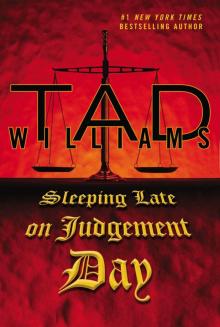 Sleeping Late on Judgement Day
Sleeping Late on Judgement Day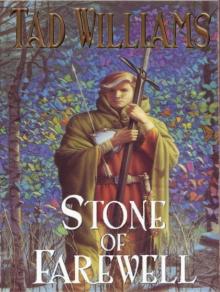 Stone of Farewell
Stone of Farewell The Dragonbone Chair
The Dragonbone Chair Sea of Silver Light
Sea of Silver Light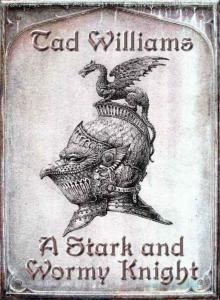 A Stark and Wormy Knight
A Stark and Wormy Knight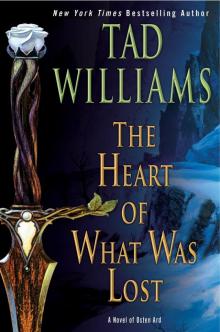 The Heart of What Was Lost
The Heart of What Was Lost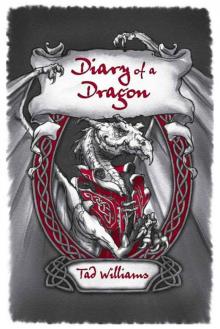 Diary of a Dragon
Diary of a Dragon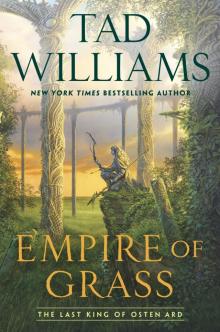 Last King of Osten Ard 02 - Empire of Grass
Last King of Osten Ard 02 - Empire of Grass To Green Angel Tower, Volume 1
To Green Angel Tower, Volume 1 The Dirty Streets of Heaven
The Dirty Streets of Heaven River of Blue Fire
River of Blue Fire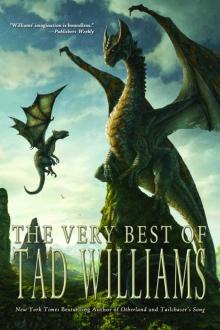 The Very Best of Tad Williams
The Very Best of Tad Williams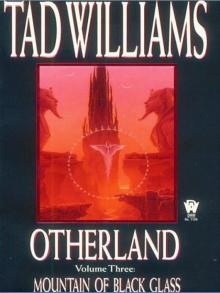 Mountain of Black Glass
Mountain of Black Glass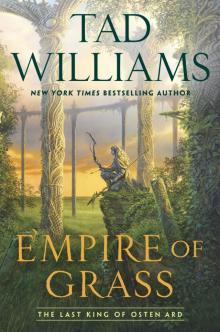 Empire of Grass
Empire of Grass City of Golden Shadow
City of Golden Shadow Happy Hour in Hell
Happy Hour in Hell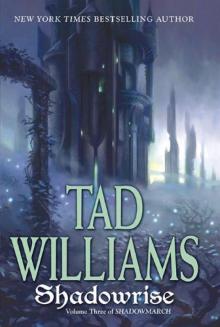 Shadowrise
Shadowrise Shadowmarch
Shadowmarch Brothers of the Wind
Brothers of the Wind Shadowheart
Shadowheart Bobby Dollar 02 - Happy Hour In Hell
Bobby Dollar 02 - Happy Hour In Hell The War of the Flowers
The War of the Flowers The Dirty Streets of Heaven bd-1
The Dirty Streets of Heaven bd-1 Tad Williams - The War of the Flowers (retail) (pdf)
Tad Williams - The War of the Flowers (retail) (pdf) Shadowheart s-4
Shadowheart s-4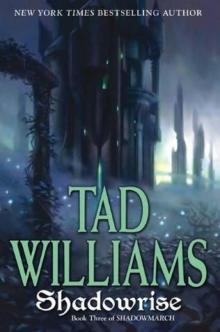 Shadowrise s-3
Shadowrise s-3 The Dirty Streets of Heaven: Volume One of Bobby Dollar
The Dirty Streets of Heaven: Volume One of Bobby Dollar The Stone of Farewell
The Stone of Farewell (Shadowmarch #1) Shadowmarch
(Shadowmarch #1) Shadowmarch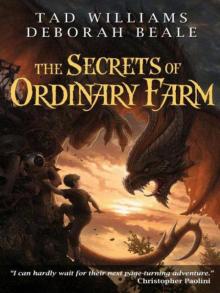 The Secrets of Ordinary Farm of-2
The Secrets of Ordinary Farm of-2 Shadowmarch s-1
Shadowmarch s-1![Bobby Dollar [04] God Rest Ye Merry, Gentlepig Read online](http://i1.bookreadfree.com/i1/04/06/bobby_dollar_04_god_rest_ye_merry_gentlepig_preview.jpg) Bobby Dollar [04] God Rest Ye Merry, Gentlepig
Bobby Dollar [04] God Rest Ye Merry, Gentlepig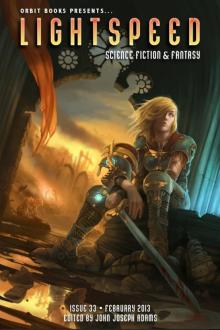 Lightspeed Issue 33
Lightspeed Issue 33 Sea of Silver Light o-4
Sea of Silver Light o-4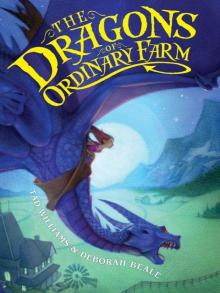 The Dragons of Ordinary Farm of-1
The Dragons of Ordinary Farm of-1 Shadowplay s-2
Shadowplay s-2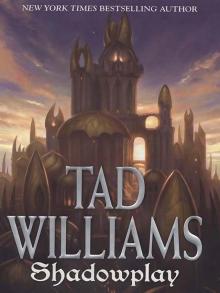 (Shadowmarch #2) Shadowplay
(Shadowmarch #2) Shadowplay